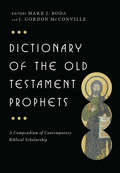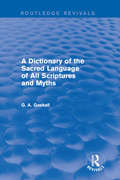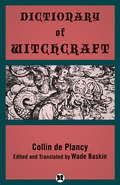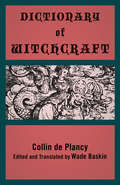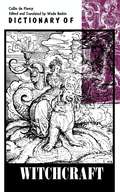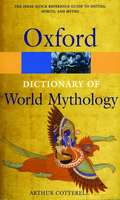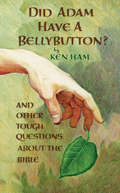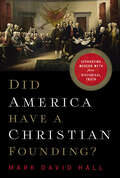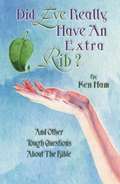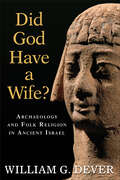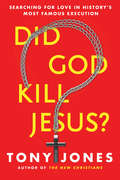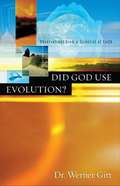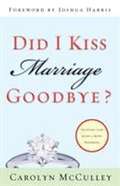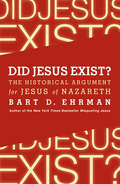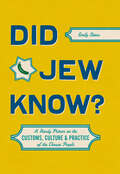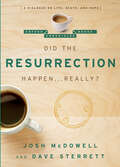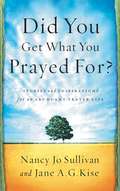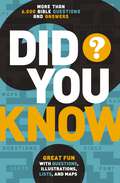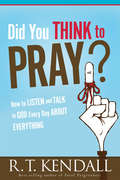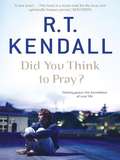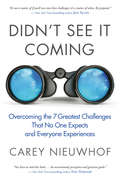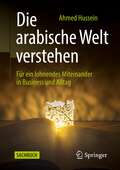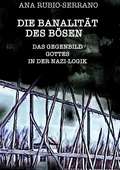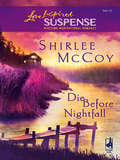- Table View
- List View
Dictionary of the Old Testament: Prophets (The IVP Bible Dictionary Series)
by Mark J. Boda2013 ECPA Book Award finalistDictionary of the Old Testament: Prophets
A Dictionary of the Sacred Language of All Scriptures and Myths (Routledge Revivals)
by G GaskellG. A. Gaskell’s Dictionary of the Sacred Language of All Scriptures and Myths, first published in 1923, examines several different aspects of religion, including examples from Ancient Egyptian religion and mythology to modern-day Christianity, providing explanations of gods, events, and symbols in alphabetical order. This is a perfect reference book for students of theology or the history of religion.
Dictionary of Witchcraft
by Wade Baskin Collin De PlancyDictionary of Witchcraft is a must-have resource for anyone interested in witchcraft, pagan religions, and the occult. This historical dictionary was the first reference work to seriously document superstitions, manifestations, magic, and superstitions. The author's interest was to compile a vast amount of matter that would interest, entertain and instruct others. This dictionary was consulted by some of the greatest Romantic writers, notably by Hugo. Collin de Plancy followed the tradition of many previous demonologists of cataloguing demons by name and title of nobility, as it happened with grimoires like Pseudomonarchia Daemonum and The Lesser Key of Solomon among others. It is considered a major work documenting beings, characters, books, deeds, and causes which pertain to the manifestations and magic of trafficking with Hell; divinations, occult sciences, grimoires, marvels, errors, prejudices, traditions, folktales, the various superstitions, and generally all manner of marvelous, surprising, mysterious, and supernatural beliefs.
Dictionary of Witchcraft: Dictionary Of Satanism, Dictionary Of Witchcraft, And Dictionary Of Pagan Religions
by Collin de PlancyThe original and authoritative A-to-Z reference guide to witchcraft, paganism, and magic, compiled by the famed nineteenth-century French occultist. Following its original publication in 1818, Collin de Plancy&’s Dictionnaire Infernal became a landmark study of witchcraft, pagan religions, and the occult. The first reference work to seriously document manifestations, magic, and superstitions, this historical dictionary details beings, characters, books, deeds, and causes that pertain to the manifestations and magic of trafficking with Hell, as well as divinations, occult sciences, grimoires, marvels, errors, prejudices, traditions, folktales, the various superstitions, and all manner of marvelous, surprising, mysterious, and supernatural beliefs. A significant influence on the Romantic literary movement and notably consulted by author Victor Hugo, it remains an essential text for any student of the dark arts or demonology.
Dictionary of Witchcraft
by Collin De PlancyDictionary of Witchcraft is a must-have resource for anyone interested in witchcraft, pagan religions, and the occult. This historical dictionary was the first reference work to seriously document superstitions, manifestations, magic, and superstitions. The author’s interest was to compile a vast amount of matter that would interest, entertain and instruct others. This dictionary was consulted by some of the greatest Romantic writers, notably by Hugo. Collin de Plancy followed the tradition of many previous demonologists of cataloguing demons by name and title of nobility, as it happened with grimoires like Pseudomonarchia Daemonum and The Lesser Key of Solomon among others. It is considered a major work documenting beings, characters, books, deeds, and causes which pertain to the manifestations and magic of trafficking with Hell; divinations, occult sciences, grimoires, marvels, errors, prejudices, traditions, folktales, the various superstitions, and generally all manner of marvelous, surprising, mysterious, and supernatural beliefs. This edition was translated and introduced by occultist Wade Baskin. Collin de Plancy (1794–1881) was a French occultist, demonologist, author, and translator. His best-known work, Dictionary of Witchcraft (Dictionnaire Infernal), was published in 1818 but didn’t receive wide acclaim until 1863 when a set of 69 illustrations by Louis Breton were added. Later in life, de Plancy converted to Catholicism and focused his studies on Catholic histories and mysticisms.
A Dictionary of World Mythology
by Arthur CotterellRecent interest in mythology indicates a general recognition of the power of the poetical tales. But there is still a fair measure of disagreement as to what is the strength of myths. For Plato, the first known user of the term, mythologia meant no more than the telling of stories which usually contained legendary figures. Another theory of origin is that folklore and mythology are almost indistinguishable. In the arrangement of this book can be discerned the seven great traditions of world mythology: namely, West Asia, South and Central Asia, East Asia, Europe, America, Africa, and Oceania.
Did Adam Have a Bellybutton?
by Ken HamThese concise, relevant topics answer questions on the minds of Christians and seekers everywhere. Ham has discovered that multitudes of people want to know the answers to key questions like, "Where did Cain get his wife?" and "How could Noah fit all of those animals on the ark?" The Bible does have answers to tough questions such as these, so there's no reason Christians can't defend their faith against attack. On each page of the book, Ham takes a popular question and gives an answer that is both plausible and faith-strengthening. With a reputation as one of the world's foremost authorities on the debate between creation and evolution, Ham provides many new insights in his latest work. SAMPLE QUESTIONS: Couldn't there have been a race of people before Adam and Eve? If Adam lived 6,000 years ago, why do some say the earth is billions of years old? What if God used evolution to create? What is the Gap Theory?
Did America Have a Christian Founding?: Separating Modern Myth from Historical Truth
by Mark David HallA distinguished professor debunks the assertion that America's Founders were deists who desired the strict separation of church and state and instead shows that their political ideas were profoundly influenced by their Christian convictions.In 2010, David Mark Hall gave a lecture at the Heritage Foundation entitled "Did America Have a Christian Founding?" His balanced and thoughtful approach to this controversial question caused a sensation. C-SPAN televised his talk, and an essay based on it has been downloaded more than 300,000 times.In this book, Hall expands upon this essay, making the airtight case that America's Founders were not deists. He explains why and how the Founders' views are absolutely relevant today, showingthat they did not create a "godless" Constitution;that even Jefferson and Madison did not want a high wall separating church and state;that most Founders believed the government should encourage Christianity; andthat they embraced a robust understanding of religious liberty for biblical and theological reasons.This compelling and utterly persuasive book will convince skeptics and equip believers and conservatives to defend the idea that Christian thought was crucial to the nation's founding--and that this benefits all of us, whatever our faith (or lack of faith).
Did Eve Really Have an Extra Rib?
by Ken Ham100% evolution-free and biblically correct Sequel to the popular Did Adam Have a Bellybutton? Popular creationist speaker Ken Ham answers the most-asked questions about creation Same easy-to-read question-and-answer format that made the first book so popular Questions are taken from scripts of Ken Ham's call-in radio program aired on over 5,000 radio stations This book continues where Did Adam Have a Bellybutton? left off with more questions about creation and the Bible. These questions were taken directly from Ken Ham's nationwide, call-in radio program, Answers . . . with Ken Ham, and he answers each one with rapid-fire delivery and accuracy.
Did God Have a Wife?: Archaeology and Folk Religion in Ancient Israel
by William G. DeverFollowing up on his two recent, widely acclaimed studies of ancient Israelite history and society, William Dever here reconstructs the practice of religion in ancient Israel from the bottom up. Archaeological excavations reveal numerous local and family shrines where sacrifices and other rituals were carried out. Intrigued by this "folk religion" in all its variety and vitality, Dever writes about ordinary people in ancient Israel and their everyday religious lives.Did God Have a Wife? shines new light on the presence and influence of women's cults in early Israel and their implications for our understanding of Israel's official "Book religion." Dever pays particular attention to the goddess Asherah, reviled by the authors of the Hebrew Bible as a foreign deity but, in the view of many modern scholars, popularly envisioned in early Israel as the consort of biblical Yahweh. His work also gives new prominence to women as the custodians of Israel's folk religion.The first book by an archaeologist on ancient Israelite religion, this fascinating study critically reviews virtually all of the archaeological literature of the past generation, while also bringing fresh evidence to the table. Though Dever digs deep into the past, his discussion is extensively illustrated, unencumbered by footnotes, and vivid with colorful insights. Meant for professional and general audiences alike, Did God Have a Wife? is sure to spur wide and passionate debate.
Did God Kill Jesus?: Searching for Love in History's Most Famous Execution
by Tony JonesThe theologian and author of The God of Wild Places dispels the angry God narrative of crucifixion in this uplifting and accessible book.Many Christians believe that God the Father demanded his only Son die a cruel, gruesome death to appease His wrath, since humanity is so irredeemably sinful and therefore repugnant to God. Tony Jones, popular progressive Christian blogger, author, and scholar, argues that this understanding is actually a medieval invention and not what the Bible really teaches. In Did God Kill Jesus?, Jones looks beyond medieval convictions to reframe how we see Jesus's death. Christians today must transcend the shame and guilt that have shaped conceptions of the human soul and made us fearful of God, and replace them with love, grace, and joyfulness, which better expresses what the cross is really about.How we understand the cross reflects directly what kind of God we worship. By letting go of the wrathful God who cannot stand to be in our presence unless he pretends to see Jesus in our place, we discover the biblical God who reaches out to love and embrace us while "we were yet sinners." Jones offers a positive, loving, inclusive interpretation of the faith that is both challenging and inspiring.
Did God Use Evolution?
by Dr Werner GittDrawing from a variety of topics - biology, biblical chronology, and the origin of human language - and showing their relation to one another in solving this question, author Werner Gitt reveals that evolution is not only bad science, it also violates Scripture. Written for the layman, but with a scientific slant, this compelling book devastates Darwinian arguments for the origin of our universe and planet. In helping Christians answer attacks on their faith, Gitt addresses relevant subjects such as: The origin of man The origin of human language Human behavior The origin and future of the universe
Did I kiss Marriage Goodbye? Trusting God with a Hope Deferred
by Carolyn Mcculleythrough personal anecdotes and careful examination of Scripture, Carolyn McCulley challenges single women to regard their singleness not as a burden, but as a gift from God that allows them to perform a unique role in the body of Christ.
Did Jesus Exist?
by Bart D. EhrmanFor years Bart Ehrman has been routinely bombarded with one question: Did Jesus Exist? As a leading Bible expert, fans and critics alike have sent letters, emails, posted blogs, and questioned Ehrman during interviews wanting his opinion about this nagging question that has become a conspiracy theorist cottage industry the world over. The idea that the character of Jesus was an invention of the early church-and later a tool of control employed by the Roman Catholic Church-is a widely held belief and Ehrman has decided it's time to put the issue to rest. Yes, the historical Jesus of Nazareth did exist. Known as a master explainer with deep knowledge of the field, Ehrman methodically demolishes both the scholarly and popular "mythicist" arguments against the existence of Jesus. Marshaling evidence from within the Bible and the wider historical record of the ancient world, Ehrman tackles the key issues that surround the popular mythologies associated with Jesus and the early Christian movement. Throughout Did Jesus Exist? Ehrman establishes the criterion for any genuine historical investigation and provides a robust defense of the methods required to discover the Jesus of history. Those committed to the "non-existence" theory will need to read this formidable scholar's counter argument while the more traditionally minded will enthusiastically support Ehrman's definitive answer to the question. Perfect for the vigorous online debating community, this eBook original will be a must read for anyone interested in Jesus, the Bible, and the birth of Christianity.
Did Jew Know?: A Handy Primer on the Customs, Culture & Practice of the Chosen People
by Emily StoneAn addictively readable mix of practical information, fun facts and figures, and amusing trivia about Jewish life.This witty handbook serves up a hearty stew of all things Jew. Did Jew Know is filled with fun, surprising, and informative facts about all aspects of Jewish life. Need to know about all those second-tier holidays no one ever celebrates? We’ve got you covered. Curious about kosher laws and Kabbalah? Have no fear. Join us for a history of the Jewish people from Saul to Seinfeld, a rundown of bubbe-approved nosh, and details about the Jewish invention of . . . everything. Packed with infographics, quizzes, and charts, this handy primer is perfect for cocktail conversation, sharing facts around the Seder table, or celebrating the unlikely triumphs of the Chosen People.
Did the Resurrection Happen . . . Really?: A Dialogue on Life, Death, and Hope (The Coffee House Chronicles)
by Josh McDowell Dave SterrettWith over 40 million books sold, bestselling author Josh McDowell is no stranger to creatively presenting biblical truth. Now, partnering with fellow apologist Dave Sterrett, Josh introduces a new series targeted at the intersection of story and truth.The Coffee House Chronicles are short, easily devoured novellas aimed at answering prevalent spiritual questions. Each book in the series tackles a long-contested question of the faith, and then answer these questions with truth through relationships and dialogue in each story.In Did the Resurrection Happen, Really?: A Dialogue on Life, Death, and Hope, the college campus is rocked by a shooting spree that leaves nine students dead. Their up-close experience with mortality allies the coffee house discussion group together to really wrestle with the spiritual and eternal ramifications of whether or not Jesus rose from the dead.The other two books in the series: Is the Bible True, Really? and Who is Jesus, Really? continue the unfolding story at the college campus and the coffee house down the road.
Did the Resurrection Happen . . . Really?: A Dialogue on Life, Death, and Hope (The Coffee House Chronicles)
by Josh McDowell Dave SterrettWith over 40 million books sold, bestselling author Josh McDowell is no stranger to creatively presenting biblical truth. Now, partnering with fellow apologist Dave Sterrett, Josh introduces a new series targeted at the intersection of story and truth.The Coffee House Chronicles are short, easily devoured novellas aimed at answering prevalent spiritual questions. Each book in the series tackles a long-contested question of the faith, and then answer these questions with truth through relationships and dialogue in each story.In Did the Resurrection Happen, Really?: A Dialogue on Life, Death, and Hope, the college campus is rocked by a shooting spree that leaves nine students dead. Their up-close experience with mortality allies the coffee house discussion group together to really wrestle with the spiritual and eternal ramifications of whether or not Jesus rose from the dead.The other two books in the series: Is the Bible True, Really? and Who is Jesus, Really? continue the unfolding story at the college campus and the coffee house down the road.
Did You Get What You Prayed For?: Keys to an Abundant Prayer Life
by Jane Kise Nancy Jo SullivanMillions of people struggle with questions about how to pray, what to pray for, and even whether to pray at all. Nancy Jo Sullivan and Jane Kise help people get away from the magic formula mentality of prayer and recognize how God is at work in their lives. With explorative retellings of relevant Bible stories, true accounts of people's prayer experiences, and reflections by the authors, this book will lead people past the topic of prayer and straight to the God who is listening.Well, did you get what you prayed for? Or are you weary of waiting for answers? Wondering if God is even listening? You're not alone. Millions of people grapple with knowing how to pray, asking: Have I used the right words? Do I even deserve an answer? Why would God listen to me? Yet the essence of prayer is not a formula, but a relationship with God. Renew your hope and refresh your prayer life through these inspiring, true stories. Meet people who discovered that God indeed hears, cares about the details, and gives you exactly what you need. Encouraging. Relevant. Uplifting! From the Trade Paperback edition.
Did You Know?: More Than 6,000 Bible Questions and Answers
by Thomas NelsonLearning about the Bible is one of the most important things you can do. It can also be fun and exciting! Did You Know? helps you engage the Bible from beginning to end in new and interesting ways. For ease of use, questions are sorted into sections, including History, Poetry, Prophecy, Gospels, Acts of the Apostles, and Epistles. Short answer, true/false, and multiple choice questions help scholars and laypeople alike learn Bible facts with ease. Illustrations, lists, and maps are perfect tools for visual learners. Did You Know? is enjoyable for Bible enthusiasts of all ages and life-stages, and is the perfect choice for any individual or small group looking to learn Bible facts and have a little fun along the way. Features include: 6,000 Bible questions and answers teach facts in fun waysSections are easy to navigateBackground information provides a deeper understanding of biblical factsIllustrations, lists, and maps engage visual learners
Did You Think To Pray: How to Listen and Talk to God Every Day About Everything
by R. T. KendallYour heavenly Father values you as much as anybody who has ever lived. Think about that! God loves you and wants to talk to you. With prayer, we all have equal access…we are all on level ground. What&’s more, prayer gives you the privilege of access to ultimate power. God can make anything happen. He can heal. Solve any problem. Change your financial situation. Open doors. Cause everything that has happened in your past (whether it was right or wrong, whether you were right or wrong) to work together for good. Did You Think to Pray? helps you to better understand what prayer is, why it is so important, and how you can overcome the obstacles that prevent you from doing it. Learn how to make prayer the foundation of your life…you can only benefit from spending more time with God. &“I cannot imagine a greater motivation to pray than that God enjoys having me in His presence. He enjoys my company. He delights in listening to me! He doesn&’t get bored with my repeated requests. He never makes me feel stupid. There is no rejection, only total acceptance.&” --R.T. Kendall in Did You Think to Pray?
Did You Think to Pray?: How To Listen And Talk To God Every Day About Everything
by R.T. KendallChildren spell love T-I-M-E. What if God spells love T-I-M-E?The brilliant new book by bestselling Christian writer, R. T. Kendall.Prayer is one of the most fundamental practices of the Christian faith, yet how many of us really commit adequate time to talking to God? As R. T. points out in DID YOU THINK TO PRAY?, God likes our company. We can only benefit from spending more time with him.This wonderful new book helps us to better understand what prayer is, why it is so important and how we can overcome the obstacles that seem to prevent us doing it.
Didn't See It Coming: Overcoming the Seven Greatest Challenges That No One Expects and Everyone Experiences
by Carey NieuwhofAn influential pastor, podcaster, and thought leader believes it's not only possible to predict life's hardest moments, but also to alter outcomes, overcome challenges, and defeat your fiercest adversaries.Founding Pastor of one of North America's most influential churches, Carey Nieuwhof wants to help you avoid and overcome life's seven hardest and most crippling challenges: cynicism, compromise, disconnectedness, irrelevance, pride, burnout, and emptiness. These are challenges that few of us expect but that we all experience at some point. If you have yet to confront these obstacles, Carey provides clear tools and guidelines for anticipation and avoidance. On the other hand, if you already feel stuck in a painful experience or are wrestling with one of these challenges, he provides the steps you need to find a way out and a way forward into a more powerful and vibrant future.
Die arabische Welt verstehen: Für ein lohnendes Miteinander in Business und Alltag
by Ahmed HusseinDieser Leitfaden schlägt eine Brücke zur arabischen Welt. Kulturelle Prägungen, Debatten über Stolpersteine der Verständigung, gegenseitige Erwartungshaltungen sowie historische Fakten werden ausführlich behandelt. Ein ausgezeichneter Ratgeber für Interessierte an den arabischen Regionen, der zugleich Studierenden arabischer Fachgebiete sowie in der Integrationsarbeit Engagierten wertvolles Praxis- und Hintergrundwissen bietet: Für ein lohnendes Miteinander.
Die Banalität des Bösen: Das Gegenbild Gottes in der Nazi-Logik
by Ana Rubio-SerranoZiel dieses Buches ist es, nicht nur das historische Auschwitz zu zeigen, sondern das Auschwitz, das im Menschen Wurzeln geschlagen hat: die Unfähigkeit, Gut und Böse zu unterscheiden; die Besessenheit, die eigene Identität als einzigartig menschlich zu bekräftigen und die Unmöglichkeit, das Anderssein zu denken, so dass dies bis heute als Vermächtnis fortbesteht, dessen Vollstrecker und Erbe unsere Welt ist. Auschwitz ist also der Startpunkt, aber nicht der Endpunkt. Es ist eine Studie, die das Modell des Anti-Menschen zeigt, das aus der Nazi-Anthropologie hervorgegangen ist, im Gegensatz zu dem Modell des Menschen, das die christliche Anthropologie offenbart. Teilveröffentlichung einer Doktorarbeit.
Die Before Nightfall (Mills And Boon Love Inspired Ser.)
by Shirlee MccoyRaven Stevenson was in Lakeview barely twenty-four hours when she heard those ominous words. She'd come to the small Virginie town to reconcile with her brother and forget the haunting memories of her past. She didn't expect to find friends, community--or a thirty-five-year-old mystery of tragic love. Nor did she expect to meet Shane Montgomery, whose love for his ailing aunt Abby breaks through Raven's carefully built defenses. When Abby unwittingly shares some of the secrets behind that long-buried mustery, she and Raven are targeted by someone who wants those secrets silenced--and who's willing to kill both of them to do it.
